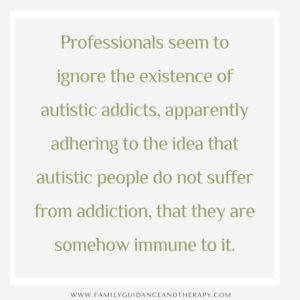Nobody really knows the extent of the long-term mental health ramifications caused by the pandemic, post-COVID or not.
We are seeing signs that addiction and substance abuse is increasing in all demographics due to the pandemic.
Sadly, the world appears to have glazed over the uptick in addiction and self-medicating in autistic people pre-pandemic.
So, what does the overall increase post-pandemic mean for autistic individuals who may have already had a higher rate of addiction?
To answer that question, we must first understand why addiction and substance abuse happens in the autism community.
Autism and Substance Abuse
Some studies indicate that autistic adults are less likely to partake in drug use, however, research conducted by the Autism Research Centre indicates that autistics are nearly nine times more likely than non-autistic peers to use drugs to manage undesirable symptoms, including autism-related symptoms.
In these studies, individuals described using drugs to circumvent symptoms of autism, such as sensory overload and stimming behaviors, but also to improve overall mental functioning and to manage mental health symptoms including anxiety, depression, and suicidal thoughts.
David Gray-Hammond, Chief Operating Officer at NeuroClastic, succinctly journals his first-hand experience with substance abuse in his blog, Issues with Addiction Advocacy in the Autistic Community.
“Professionals seem to ignore the existence of autistic addicts, apparently adhering to the idea that autistic people do not suffer from addiction, that they are somehow immune to it.
There is a pervasive idea based on stereotypes that autistic people love rules and therefore would never do something so anarchic as to become an addict.
“Even when I was diagnosed with a substance misuse disorder, my blatant autistic traits were overlooked, and I was treated like a neurotypical suffering from addiction...the world of addiction treatment is not made with autistic people in mind. It is time we show them that we are here.”
Autism and Post-Pandemic Substance Abuse
We obviously need to create awareness of substance abuse in both the mental health and medical fields to ensure we do not shuck off or treat stress, anxiety, and other mental health challenges as symptoms of autism.
The lack of awareness is extremely dangerous as it creates a void in vital professional care and leads to self-medicating, addiction, and ultimately it increases the chances of suicide.
The pandemic has greatly affected mental health, substance use, and suicidal ideation as outlined in a report published by the CDC:
“U.S. adults reported considerably elevated adverse mental health conditions associated with COVID-19. Younger adults, racial/ethnic minorities, essential workers, and unpaid adult caregivers reported having experienced disproportionately worse mental health outcomes, increased substance use and elevated suicidal ideation.
“The public health response to the COVID-19 pandemic should increase intervention and prevention efforts to address associated mental health conditions. Community-level efforts, including health communication strategies, should prioritize young adults, racial/ethnic minorities, essential workers, and unpaid adult caregivers.” And…autistics!
The Long Term COVID-19 Effects
Substance abuse is on the rise as people, in general, are feeling the stress of life itself along with the added weight of carrying over fear and traumatic feelings of loss - especially as the world opens back up post-pandemic (and sometimes closes back down, i.e., the roller coaster of wearing masks and social distancing with cases of COVID increasing areas).
Post-pandemic, much of the world is still dealing with feelings of grief.
Grieving looks different for each person.
It can include feelings of deep sadness. It can affect our sleep and our appetites.
It can lead to us feeling restless and having poor concentration. Grief can also cause a mix of feelings such as emptiness, fear, isolation, and vulnerability.
Real Help is Here
Whether you are autistic, or the concerned parent of an autistic teen, child or young adult, we are here to help you.
We understand that pandemic stress might not go away for any of us any time soon, even after we continue returning to ‘normal’ life.
We understand that your struggles with stress, anxiety, or other mental health challenges, are not simply a symptom of autism.
We want to help you so that you do not feel it is necessary to self-medicate just to get through your day.
Do you need help today? Make an appointment now.

